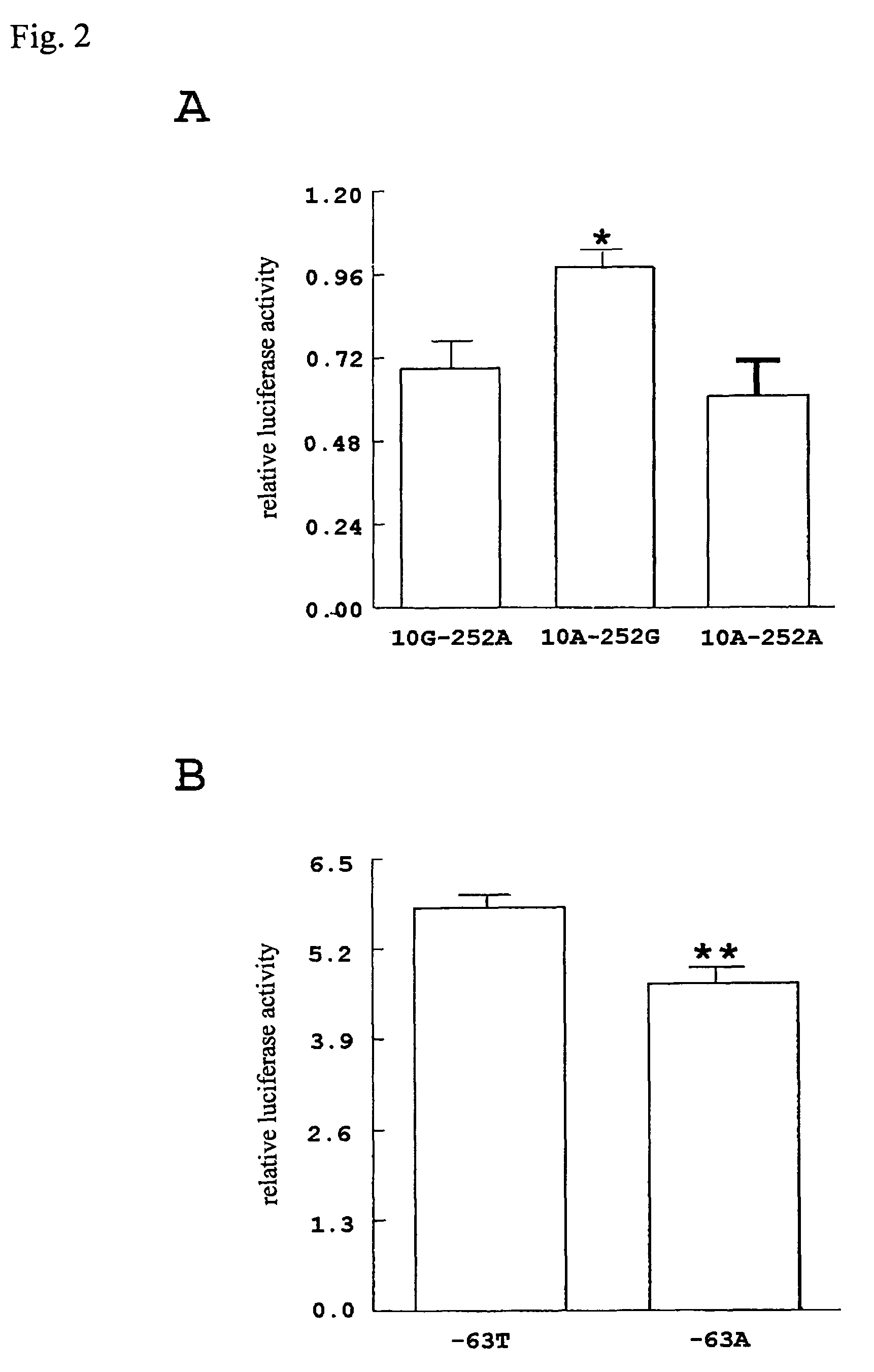Method of judging inflammatory disease
a technology of inflammatory diseases and judging methods, which is applied in the field of determining inflammatory diseases, can solve the problems of myocardial infarction, change the amount of resulting gene products, etc., and achieve the effect of lowering the expression level or activity of lymphotoxin- (lt-) and increasing the expression level or activity of the ikbl gen
- Summary
- Abstract
- Description
- Claims
- Application Information
AI Technical Summary
Benefits of technology
Problems solved by technology
Method used
Image
Examples
example 1
Association Study
[1] Method
1. Subject
[0105]In general, the diagnosis of myocardial infarction requires two of the following three criteria: (1) clinical history of central chest pressure, pain, or tightness lasting for 30 minutes or more; (2) ST-segment elevation greater than 0.1 mV in at least one standard or two precordial leads; and (3) a rise in serum creatine kinase concentration to greater than twice the normal laboratory value. 1,133 patients diagnosed as having myocardial infarction based on these criteria were subjected to the study. The ages of the subjects with myocardial infarction ranged from 28 to 85 years old, and the mean age was 62.5 years old. In the meantime, 1,006 healthy subjects who had applied for this study through some medical institutions were subjected to the study as controls. The ages of the control subjects ranged from 5 to 88 years old and the mean age was 38.5 years old. In addition, all subjects were Japanese.
2. SNP Discovery and Genotyping
[0106]For ...
example 2
Increase in Transcriptional Activity Brought About by SNP in Intron 1 of LT-α
(1) Experimental Method
[0116]DNA fragments corresponding to −307 to 268 of LT-α, −635 to 15 of IKBL, and −1231 to 30 of BAT1 were amplified by PCR using genomic DNA as template, and cloned in pGL3-basic vector (Promega) in the 5′-3′ orientation. Jurkut cells (obtained from RIKEN Cell Bank; RCB0806) were grown in a RPMI1640 medium supplemented with 10% fetal bovine serum. To determine whether the two SNPs in the LT-α gene, 10G>A in exon 1 and 252A>G in intron I, would affect its expression level, three kinds of plasmids with a genomic fragment containing both SNPs (10G-252A, 10A-252G, and 10A-252A haplotype) upstream of a luciferase gene transcriptional unit, were constructed.
[0117]The above Jurkut cells (2×106) were transfected with 10 μg of the above plasmid construct and 2.5 μg of pRL-TK vector (internal control for transfection efficiency) using a LipoTAXI transfection reagent (Stratagene). 6 hours later...
example 3
Binding of Unknown Nuclear Factor to LT-α Intron 1
(1) Experimental Method
[0121]Whether or not nuclear extracts from Jurkat cells can bind to oligonucleotides corresponding to genomic sequences containing a 252A or 252G allele was examined. As described in Andrews, N. C. et al., Nucleic, Acid Res., 11, 2499, 1991, nuclear extracts prepared from Jurkat cells were incubated with a 33-bp oligonucleotide labeled with digoxigenin (DIG)-11-ddUTP using a DIG-gel shift kit (Roche). For competitive study, an unlabeled oligonucleotide (100-fold excess) was pre-cultured with the nuclear extract before addition of DIG-labeled oligonucleotide. The protein / DNA complexes were separated on a non-denaturing 7% polyacrylamide gel in a 0.5×Tris / Borate / EDTA (TBE) buffer. The gel was transferred to a nitrocellulose membrane, and detection of the signal was performed with a chemiluminescent detection system (Roche) according to the manufacturer's instructions.
(2) Experimental Results
[0122]As shown in FIG....
PUM
| Property | Measurement | Unit |
|---|---|---|
| pH | aaaaa | aaaaa |
| adhesion | aaaaa | aaaaa |
| frequencies | aaaaa | aaaaa |
Abstract
Description
Claims
Application Information
 Login to View More
Login to View More - R&D
- Intellectual Property
- Life Sciences
- Materials
- Tech Scout
- Unparalleled Data Quality
- Higher Quality Content
- 60% Fewer Hallucinations
Browse by: Latest US Patents, China's latest patents, Technical Efficacy Thesaurus, Application Domain, Technology Topic, Popular Technical Reports.
© 2025 PatSnap. All rights reserved.Legal|Privacy policy|Modern Slavery Act Transparency Statement|Sitemap|About US| Contact US: help@patsnap.com



